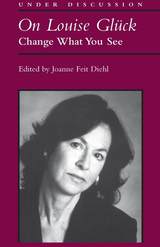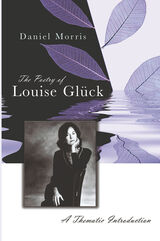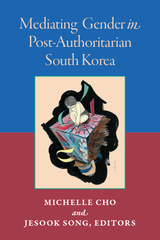2 books about 1943-2023

On Louise Gluck
Change What You See
Joanne Feit Diehl, Editor
University of Michigan Press, 2005
On Louise Glück features essays by leading critics, poets, and scholars that explore the work of recent U.S. poet laureate Louise Glück.
Glück, author of nine books of poetry, including the Pulitzer Prize-winning The Wild Iris, is noted for her searing honesty and compelling first-person personae. Though compared to world-famous verse by Sappho and Dickinson, Glück's poetry has remained curiously undigested among readers of contemporary poetry for some time. On Louise Glück gathers for the first time a diverse array of essays by the leading critics of this preeminent poet. Featuring a probing, extended interview with Glück, On Louise Glück traces the critical reception of her work and offers new insights into her imaginative, mysterious poetry.
Glück, author of nine books of poetry, including the Pulitzer Prize-winning The Wild Iris, is noted for her searing honesty and compelling first-person personae. Though compared to world-famous verse by Sappho and Dickinson, Glück's poetry has remained curiously undigested among readers of contemporary poetry for some time. On Louise Glück gathers for the first time a diverse array of essays by the leading critics of this preeminent poet. Featuring a probing, extended interview with Glück, On Louise Glück traces the critical reception of her work and offers new insights into her imaginative, mysterious poetry.
[more]

The Poetry of Louise Glück
A Thematic Introduction
Daniel Morris
University of Missouri Press, 2006
A dominant figure in American poetry for more than thirty-five years, Louise Glück has been the recipient of virtually every major poetry award. She won the Nobel Prize in Literature in 2020 and was named U.S. poet laureate for 2003–2004. In a full-length study of her work, Daniel Morris explores how this prolific poet utilizes masks of characters from history, the Bible, and even fairy tales.
Morris treats Glück’s persistent themes—desire, hunger, trauma, survival—through close reading of her major book-length sequences from the 1990s: Ararat, Meadowlands, and The Wild Iris. An additional chapter devoted to The House on Marshland (1975) shows how its revision of Romanticism and nature poetry anticipated these later works. Seeing Glück’s poems as complex analyses of the authorial self via sustained central metaphors, Morris reads her poetry against a narrative pattern that shifts from the tones of anger, despair, and resentment found in her early Firstborn to the resignation of Ararat—and proceeds in her latest volumes, including Vita Nova and Averno, toward an ambivalent embrace of embodied life.
By showing how Glück’s poems may be read as a form of commentary on the meanings of great literature and myth, Morris emphasizes her irreverent attitude toward the canons through which she both expresses herself and deflects her autobiographical impulse. By discussing her sense of self, of Judaism, and of the poetic tradition, he explores her position as a mystic poet with an ambivalent relationship to religious discourse verging on Gnosticism, with tendencies toward the ancient rabbinic midrash tradition of reading scripture. He particularly shows how her creative reading of past poets expresses her vision of Judaism as a way of thinking about canonical texts.
The Poetry of Louise Glück is a quintessential study of how poems may be read as a form of commentary on the meanings of great literature and myth. It clearly demonstrates that, through this lens of commentary, one can grasp more firmly the very idea of poetry itself that Glück has spent her career both defining and extending.
[more]
READERS
Browse our collection.
PUBLISHERS
See BiblioVault's publisher services.
STUDENT SERVICES
Files for college accessibility offices.
UChicago Accessibility Resources
home | accessibility | search | about | contact us
BiblioVault ® 2001 - 2024
The University of Chicago Press









